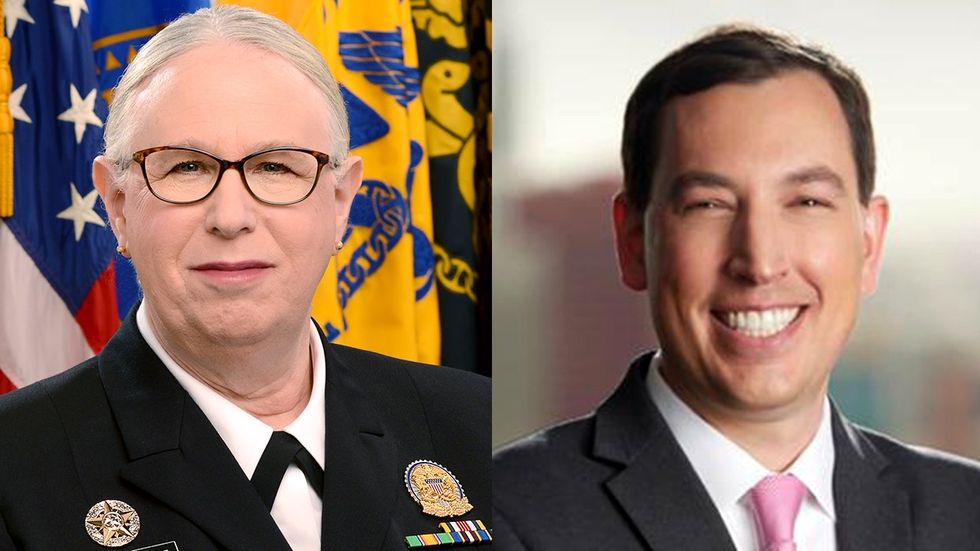In the wake of numerous discussions, panels, and speeches at PFLAG’s National Convention in Arlington, VA. last month, a notable conversation took place to illuminate the shadows cast by disinformation on trans healthcare.
The ambiance within the Crystal Ballroom at DoubleTree Crystal City was anything but cold as attendees gathered for a crucial dialogue on trans healthcare. The session, “Courageous Love in Trans Healthcare,” moderated by writer and activist Charlotte Clymer, featured a panel of health experts, including Admiral Rachel L. Levine, the assistant secretary for health in the U.S. Department of Health and Human Services, and Dr. Jesse M. Ehrenfeld, the president of the American Medical Association. The focus was clear — to dismantle the towering wall of disinformation encircling trans healthcare and foster a narrative grounded in facts and empathy.
Levine, who is trans, wasted no time in addressing one of the frequently misunderstood aspects of trans healthcare — the use of puberty blockers.
She explained, “Puberty blockers have been used for a long time. They’re used for a condition called precocious puberty or early puberty, and there was a protocol developed first in the Netherlands probably 15 to 20 years ago, where transgender children could get blockers as they continue to be with their family and to work with their therapists and their physician.” Her words emphasized the long-standing medical practice and the familial and medical support integral to the protocol.
Related: Rachel Levine Discusses Disturbing ‘Medical Refugees’ Crisis Sweeping Across the U.S.
Ehrenfeld, an out gay man whose husband and four-year-old son were also in attendance, brought to light a grave concern — a lawsuit challenging the abortion drug mifepristone that threatens to unravel the FDA’s approval process for certain medications, including puberty blockers.
He stressed, “…if this is going to go to the Supreme Court [and] if the Supreme Court decides that the FDA regulatory process for how we approve drugs and medications and biologics in this country doesn’t work or isn’t appropriate, it will cause chaos because there is a whole list of other medications, puberty blockers included, that will suddenly be challenged.” He outlined this could spawn a cascade of challenges against numerous medications, fuelled by disinformation and devoid of scientific basis.
The conversation also touched upon false narratives emerging from certain European countries re-evaluating gender-affirming care for youth.
Ehrenfeld clarified, “We evaluate our policies all the time because we want to make sure that whatever the science and evidence it is, we’re holding it up… based on what we have today, we have a clear policy that makes sense.”
He underscored the unwavering commitment to evidence-based policies amidst a swirl of misinformation.
Engaging the community emerged as a pivotal theme.
“We know that public perceptions change when you know someone who’s in the community... we can only help educate those in the community if we’re out there having those conversations,” Levine said.
Her call to action resonated as a reminder of the power of personal interactions in altering misconceptions.
According to a survey by The 19thThe 19th, 67 percent of those who know someone who is transgender support gender-affirming care for adults, while 48 percent support it for minors. However, 48 percent support gender-affirming care for those who don’t know transgender people personally, and 33 percent support it for them. For those who identify as LGBTQ+, 84 percent favor gender-affirming care for adults, and 70 percent favor it for minors.
Furthermore, the panel delved into the imperative of medical education and fostering diversity within healthcare. They advocated for an environment where all individuals, irrespective of their gender identity, are welcomed and respected.
“Diversity brings in all sorts of different experiences and different cultures and different perceptions, and it enhances any organization,” Levine said.
As the dialogue neared its conclusion, the unwavering resolve to challenge disinformation and advocate for an inclusive, evidence-based approach to trans healthcare was evident. Levine and Ehrenfeld’s potent blend of facts, empathy, and advocacy painted a hopeful picture of the road ahead.
This enlightening Saturday afternoon conversation was vital to PFLAG’s National Convention from Thursday to Sunday. On Friday, First Lady Jill Biden spoke in support of the families and friends of LGBTQ+ individuals for their unwavering advocacy for marginalized communities. Following Biden’s address, MSNBC’s Ali Velshi took the helm, moderating a panel discussion concerning book bans, sharing the stage with the president of the American Library Association, among other panelists.




















































































